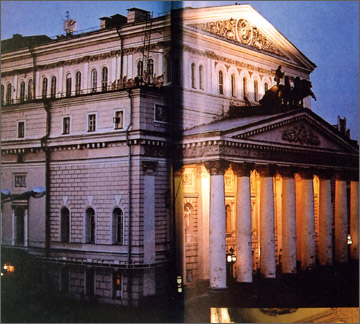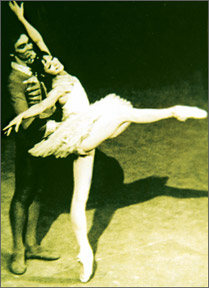Bolshoi's innate grandeur
 Around 1968 when Leonid Lavrovsky was the director of ballet and
after which Yuri Grigorovich took over, a series of large-scale, highly
spectacular productions were fully exploited within the company. This
period was typified by his 1968 revision of Khachaturian's ballet
SPARTACUS with its huge cast and epic production which achieved
worldwide acclaim. Around 1968 when Leonid Lavrovsky was the director of ballet and
after which Yuri Grigorovich took over, a series of large-scale, highly
spectacular productions were fully exploited within the company. This
period was typified by his 1968 revision of Khachaturian's ballet
SPARTACUS with its huge cast and epic production which achieved
worldwide acclaim.
Vladimir Vasiliev and his wife Ekaterina Maximova were in partnership
and dominated the Bolshoin Ballet during this period and Maximova held
the position of Ballet Mistress of the company while Ludmila Semenakya,
Nadezhda Pavlova and Alexander Godunev supported her. Along with a
wealth of classical singers, Bolshoi also boasted over their world class
symphony orchestra. Throughout its long history, it had been conducted
by Russia's greatest conductors that included Nikola Golovanov, Yuri
Faier, Alexander Melik-Pashaya, Boris Khaikin, Evgeny Svetlanov, Gennadi
Rozhdestvensky, Mstislav Rostropovich, Mark Ermler etc.
 |
|
The
magnificent Bolshoi Theatre |
Vladimir Kokonin took over the Bolshoi as its General Director from
1988-1995. In March 1995, a new era was born in the history of the
Bolshoi Theatre when under President Boris Yelstin who ushered a magical
touch when he issued a decree to the government to establish, a new
structure of the Bolshoi Theatre, appointing Kokonin as the Executive
Director and Vladimir Vasiliev as Artistic Director. Vasiliev was born
in Moscow and graduated from the Moscow Choreographic School and joined
the Bolshoi at the age of eighteen. He danced for thirty years as
principal dancer and won acclaim in both classical and modern ballet. He
created the role of SPARTACUS and so glorious was his achievement that
won him worldwide success in the role that a special medal was minted to
commemorate his spectacular achievement. Bolshoi was richer bu this
feat. Thus, he was universally acclaimed as one of the greatest dancers
of his generation and won a number of prestigious awards both at home
and abroad. As a teacher, he was determined to mould future greats and
being responsible as a great choreographer for many productions.
A wide range of reforms were introduced by Vasiliev since his
appointment as Bolshoi's Artistic Director to the operational processes
within the theatre. He involved himself not only in its day-to-day
administration but also in all aspects of creative process. His recent
productions included a new staging of Verdi's LA Traviata and the
co-production together with Anatoh Agamirov, of a new liber for SWAN
LALE. He acted as Artistic Director for the gala concert held at Kremlin
to celebrate Moscow's 850th Jubilee and staged the evening held on the
occasion of the 100th Anniversary of Moscow's Pushkin's Fine Arts
Museum.
High among Vasiliev's priorities were the plan to reconstruct the 150
year old Bolshoi Theatre and the building of a second theatre. He had
already been successful in securing an agreement from UNESCO for funding
the vital work.
Bolshoi Theatre is grand by any standard as the word Bolshoi means
'grand'. Presently 2500 people are at work for the company which
maintains a repertoire of twenty five operas and twenty five ballets and
given to 280 performances each year a packed audience of two thousand
people. Today, Bolshoi Theatre combines pride in its artistic heritage
which determines to maintain with an awareness that it must grow and
develop to the rapidly changing world.
 |
|
One of the greatest dancers of his
time, Vladimir Vasiliev with his wife, Ekaterina Maximova in
Nutcracker ballet choreographed by him. The grandeur of the
Bolshoi are all his efforts and dedication |
Victorvich Vladimir Vasiliev was born in Moscow on April 18, 1940.
With an illustrious teenage career, graduated from the Bolshoi School
and joined Bolshoi Ballet and became a soloist and an internationally
popular star. He frequently appeared with his wife, Yakaterina Maximova
on the international stage. An unstable heroic optimism and exceptional
virtuosity with irresistible dynamism made him what he is today. He
created leading roles in most of the classics, danced and choreographed
them from 1960 onwards, partnered by his wife and other lead-ballerinas.
All the while, he was being awarded with the highest dance awards for
his virtuosity and excellence. He is best remembered for the creation of
the spectacular Don Quixote in which he danced as well as appeared in
the film. His career was climaxed with the winning of the prestigious
Lenin Prize in 1970. One of his outstanding works that was difficult was
La Traviata.
Giuseppe Verdi's La Traviata one of Vasiliev's dream production, this
score by Verdi would have been a monumental task. Let alone ballet
taking it over, many conductors have shunned this score for the want of
excess variety hidden in the notes. Scored in 1853, the literal
translation of this means Fallen Woman which is not used as the title to
the score. The opera derived from this play (as found in the novel) is
about the legendary Parisian courtesan, Marie Duplessis who died from
tuberculosis in 1847 at the age of twenty three. In the novel by
Alexandre Dumas, she becomes Marguerite Gautier. In the play she is
called Camilie whose role was acted by Hollywood legend, Greta Garbo.
Many see this as Verdi limbering up to AIDA, the final magnificent score
of Verdi's second movement that was great as NABUCCO (1842).
His flawless masterpieces, somehow is more an essence of music to me.
|



